| Construction Rating: | starstarstarstarstar |
| Flight Rating: | starstarstarstarstar |
| Overall Rating: | starstarstarstarstar |
 Brief:
Brief:
In the somewhat select world of "BIG" model rockets, ("BIG"
being a relative term referring to the days before 20 foot tall high-power
rockets,) few if any can hold a candle to the Estes Mean Machine from the
standpoint of sheer size. While the Mean Machine does define "BIG"
with authority, it also presents the modeler with a unique set of challenges,
namely storage, transportability, and when painted in it's traditional black
color, an unfortunate tendency to warp in the sun. All of these
"cons" were in mind when I found a Mean Machine at a recent Hobby
Lobby 1/2 off sale, but the sale made the price too friendly to pass on. The
Machine languished among the cobwebs of my "banned from sight"
second-hand Steelcase desk for quite a while, but inspiration struck me as I
paged through my copy of the 1981 Centuri catalog. Building the Mean Machine
still didn't hold much interest for me but using my bargain basement Machine to
clone the seldom seen Centuri Thunder Roc did. The Thunder Roc is one of a
short list of post-merger Centuri rockets that were sold as Centuri kits while
using Estes parts. At the time this probably seemed like the ultimate slap in
the face to in-the-know Centuri fans, but twenty years on it sure makes cloning
these rockets a much more simple undertaking.
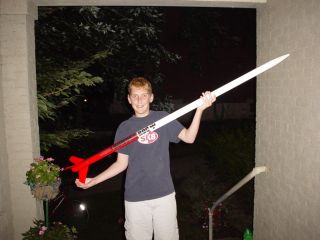 Construction:
Construction:
- 3 full length BT-60 body tubes
- 2 BT-60 tube couplers
- Estes E- Engine hook
- 1/8" balsa fin stock
- PNC-60AH
- Estes 24" nylon parachute
- 9" BT-50 engine tube
- 2050 engine block
- 2 5060 centering rings
- 5055 centering ring as engine hook hold-down
- 2 3/16" launch lugs
- 60" sewing elastic
- heavy duty snap swivel
- Plumbers Epoxy Putty
- decals
While the Mean Machine to Thunder Roc conversion appears to be a simple project at first, it's size alone makes several modifications if not necessary, then at least suggested. Since the Thunder Roc is just a Mean Machine with one less section of BT-60 and one fewer fin, I alternated between using the current Estes instruction sheet for the Mean Machine and the Thunder Roc sheets from JimZ's site. The Thunder Roc is little more than a tall 3FNC rocket and most of the construction went on with nary a problem. I used Elmer's Wood Glue for the whole project, fillets included, but that was one area where deviating from the plan was necessary. I had the body finished and had sprayed on the first coat of primer, then stood it up to allow the top of the body tube to dry. Spray painting in July can be thirsty work, and I went inside for a drink, leaving the primered rocket standing on a stray cooler. Since it had been a still, windless day, I hadn't figured on having to deal with anything resembling a breeze. I should have. Thirty minutes later I came back out onto the porch to find the rocket keeled over with one fin broken off, another fillet broken, and a crease in the body tube. My weekend plans to test fly the primered carcass had been scuttled just that quickly. (I had been drinking Sugar Free Kool Aid, which I regard as proof that clean living will get you nowhere.)
Clearly the old method of filleting the fins was not up to the task on this project. If a fall from an 18" high cooler could do that much damage, I was afraid that the fall from D-powered heights would have me gluing fins (or worse, pieces of fins) back on with each flight. Epoxy was the next logical step but in a different form. I had bought a tube of Plumber's Epoxy Putty several weeks earlier with the intention of trying to make fillets with it. The Thunder Roc seemed like the perfect test subject.
The putty comes in an "airtight" tube and looks like a piece of Cow Tail candy gone horribly wrong. As long as the two shades of grey remain separate, the putty will remain flexible, but once you activate the putty by kneading the two colors together, you are effectively beginning the curing process. I found that the putty mixed easier if I kept dipping my fingers in water. This kept the putty from sticking to my hands and seemed to make it more pliable. (Unfortunately nothing seemed to take the stink of the epoxy out of my fingers.) Once it was mixed to a uniform color I began spreading it in the area between the fin root and the body tube, just like you would when making a normal glue fillet. Some practice is necessary to keep the fillets from turning out too clunky. My first two fillets turned out just this way but it just made the placement of the launch lugs that much easier. (They're on the side of the body tube with the fat fillets and are attached with a set of fairly chunky fillets all their own.) I had originally thought that the increased weight of the fillets would have made the addition of clay to the nose cone a necessary precaution, but a swing test showed that the CP/CG relationship remained pretty much in line. I chalked this up to the increased weight of the Estes nylon chute and crossed my fingers.
Finishing:
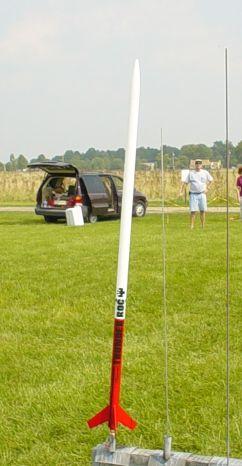 After
all of the pieces for this rocket had been pounded together, I coated the
entire structure with thinned Elmer's Fill 'n' Finish. If you're one of those
rare souls who enjoy sanding, this rocket should be right down your pike.
There's a whole lot of surface area to be sanded, including two tube
connections that are bound to take some extra filling and sanding. I'm not one
of those who enjoys this part of the build process, and my particular version
of this rocket took quite a bit of extra filling and sanding. It all turned out
to be worth it in the end. While the fillets are admittedly large, the whole
rocket looks smooth and solid. My hands may never recover but I can grip my
Thunder Roc in my misshapen claw and be proud of the job I did. (Well, not
actively sickened.) After painting the entire rocket with three coats of
Valspar Gloss White paint, I masked off the bottom portion and sprayed it with
Valspar Cherry Red Gloss. (That was the closest I found to the suggested
"Warm Red" in the Centuri instructions, but the instructions actually
said any bright color would do.) The paint colors alone would make this rocket
stand out even if it wasn't five and a half feet tall, but the height doesn't
hurt. Decals were made using Bel Decal inkjet decal paper and were printed on a
LexMark Optra printer, which I've found gives very satisfactory results when
the decals are all black. After the decals had been applied, I coated the
entire rocket with Krylon Acrylic clearcoat. This was the same clear that I had
used in coating the decals before applying them, but I wound up with markedly
different results this time. The decals crinkled slightly in several spots but
worst of all, the black ink dulled. I let things cure for several weeks after
this problem surfaced, then resprayed the entire rocket with a coat of Valspar
Clear Gloss. This seems to have taken care of the problem quite nicely as the
black decal looks great once again.
After
all of the pieces for this rocket had been pounded together, I coated the
entire structure with thinned Elmer's Fill 'n' Finish. If you're one of those
rare souls who enjoy sanding, this rocket should be right down your pike.
There's a whole lot of surface area to be sanded, including two tube
connections that are bound to take some extra filling and sanding. I'm not one
of those who enjoys this part of the build process, and my particular version
of this rocket took quite a bit of extra filling and sanding. It all turned out
to be worth it in the end. While the fillets are admittedly large, the whole
rocket looks smooth and solid. My hands may never recover but I can grip my
Thunder Roc in my misshapen claw and be proud of the job I did. (Well, not
actively sickened.) After painting the entire rocket with three coats of
Valspar Gloss White paint, I masked off the bottom portion and sprayed it with
Valspar Cherry Red Gloss. (That was the closest I found to the suggested
"Warm Red" in the Centuri instructions, but the instructions actually
said any bright color would do.) The paint colors alone would make this rocket
stand out even if it wasn't five and a half feet tall, but the height doesn't
hurt. Decals were made using Bel Decal inkjet decal paper and were printed on a
LexMark Optra printer, which I've found gives very satisfactory results when
the decals are all black. After the decals had been applied, I coated the
entire rocket with Krylon Acrylic clearcoat. This was the same clear that I had
used in coating the decals before applying them, but I wound up with markedly
different results this time. The decals crinkled slightly in several spots but
worst of all, the black ink dulled. I let things cure for several weeks after
this problem surfaced, then resprayed the entire rocket with a coat of Valspar
Clear Gloss. This seems to have taken care of the problem quite nicely as the
black decal looks great once again.
Construction Rating: 5 out of 5
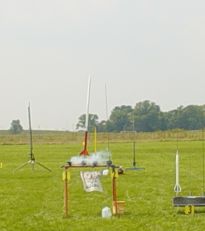 Flight:
Flight:
It took a while, including several crushing disappointments, but I finally
managed to work in a day when I could get out to launch the Thunder Roc.
Although I had built several new rockets in the two months that I wasn't
flying, the Thunder Roc was first on the pad for me at VOA on what had turned
out to be a perfect day to fly. With an almost total absence of wind, I decided
to go with a D12-5 for the first flight. I had intended to use perma wadding on
this rocket but got distracted when gluing in the motor mount and realized it
too late. This was little more than a minor irritant and I loaded the rocket
with a fairly heavy load of dog barf before I installed the nylon parachute. I
had used the standard 3/16" Mean Machine launch lugs, but they turned out
to be a tight fit on the 3/16" rod. I switched to a longer, but slimmer
rod, but so much of the Thunder Roc's mass is above the launch lugs that it
moves in even the slightest breeze. This turned out to be a big problem as
several times the rocket shifted enough to cross the wires or even pull one of
the clips off of the ignitors. I finally got it secured with the addition of a
D engine carcass to act as an extra stand off. The rocket whipped somewhat as
it left the pad, but straightened out quickly and flew majestically to a higher
altitude than I had been lead to expect.
Recovery:
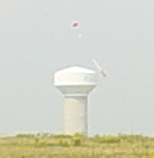 I was
determined that the Achilles Heel of the Thunder Roc wasn't going to be it's
recovery system. With this in mind I went with the Quest method of anchoring
the shock cord by knotting and gluing a length of Kevlar®
cord in place with the engine block. I ran the Kevlar®
to within six inches of the top of the body tube, then attached a five foot
length of 1/4" sewing elastic and an Estes nylon parachute. It seemed like
overkill, but the recovery system seemed like the place to go overboard with a
rocket of this size. Ejection occurred at apogee, and the rocket recovered with
much the same majesty as it had flown with, stretching out to 10+ feet and
drifting slowly to the ground. The recovery walk was a little more than normal,
but the rocket landed in a soft patch of weeds and showed no ill effects of
it's flight. I chalked this up to the non-reefed nylon chute, but then this was
the whole reason for choosing it. I'll walk a little extra for a safe recovery
on a rocket of this size any day.
I was
determined that the Achilles Heel of the Thunder Roc wasn't going to be it's
recovery system. With this in mind I went with the Quest method of anchoring
the shock cord by knotting and gluing a length of Kevlar®
cord in place with the engine block. I ran the Kevlar®
to within six inches of the top of the body tube, then attached a five foot
length of 1/4" sewing elastic and an Estes nylon parachute. It seemed like
overkill, but the recovery system seemed like the place to go overboard with a
rocket of this size. Ejection occurred at apogee, and the rocket recovered with
much the same majesty as it had flown with, stretching out to 10+ feet and
drifting slowly to the ground. The recovery walk was a little more than normal,
but the rocket landed in a soft patch of weeds and showed no ill effects of
it's flight. I chalked this up to the non-reefed nylon chute, but then this was
the whole reason for choosing it. I'll walk a little extra for a safe recovery
on a rocket of this size any day.
Flight Rating: 5 out of 5
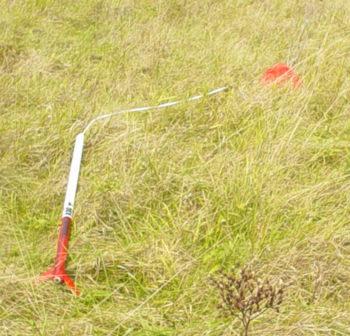 Summary:
Summary:
It's hard to find fault with a project like this. Starting with the Estes Mean
Machine means that you will not only have a proven baseline to start with, but
can also gather all most of the parts you'll need for the project by buying one
kit. While Mean Machine flights aren't exactly common, they are seen far more
often than the Machine's Centuri-based little brother.
PROs:
- Easier to transport and store than an Estes Mean Machine while still being noticeably "BIG".
- Majestic flights.
- If you make it using a stock Estes Mean Machine kit, you'll have enough parts left over to give you a good start on two Mach 10 clones.
CONs:
- You'd better have a big rod ready if you plan to fly with the big boys.
Overall Rating: 5 out of 5
 |
 |
Flights
Sponsored Ads
 |
 |










